|
|
|
Sort Order |
|
|
|
Items / Page
|
|
|
|
|
|
|
| Srl | Item |
| 1 |
ID:
105932
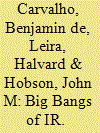

|
|
|
|
|
| Publication |
2011.
|
| Summary/Abstract |
International relations as we know them emerged through the peace of Westphalia, and the discipline of International Relations emerged in 1919 and developed through a First Great Debate between idealists and realists. These are the established myths of 1648 and 1919. In this article we demonstrate how historical and historiographical scholarship has demolished these myths, but that the myths regardless are pervasive in the current textbooks that are used in teaching future IR scholars. Disciplinary dialogue seems to have failed completely. Based on a detailed reading of the myths and their perpetuation, we discuss the consequences of the discipline's reliance on mythical origins, why there has been so little incorporation of revisionist insight and what possibilities there are for enhancing the dialogue.
|
|
|
|
|
|
|
|
|
|
|
|
|
|
|
|
| 2 |
ID:
155149
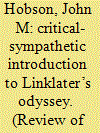

|
|
|
|
|
| Summary/Abstract |
This article provides an ‘engaged’ introduction to this forum on Andrew Linklater’s recently published book, Violence and Civilization in the Western States-Systems. I call this ‘engaged’ because I seek to adjudicate between the critics and Linklater’s book in the hope of building a bridge over troubled water. Given that the key word that underpins many of this forum’s contributions is Eurocentrism, I explore whether, and if so to what extent, Linklater’s book is Eurocentric. While I too identify various Eurocentric cues, I also provide various defences for Linklater. In particular, the final section advances two definitions of Eurocentrism and anti-Eurocentrism. Although I identify elements of ‘Eurocentrism I’ (the elision of non-Western agency and reification of the West) in his book, Linklater might respond to the principal forum complaint that he accords little or no role to non-Western actors and processes in the Western or global civilizing process by appealing to an alternative anti-Eurocentric approach: ‘anti-Eurocentrism II’ (which focuses squarely on Western imperial power and ignores or heavily downplays non-Western agency). I close by critiquing his left-liberal cosmopolitan politics, arguing that his Eurocentric-universalist normative posture cannot create the kind of peaceful and harmonious world that he (and Kant) so desires.
|
|
|
|
|
|
|
|
|
|
|
|
|
|
|
|
| 3 |
ID:
145136
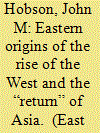

|
|
|
|
|
| Summary/Abstract |
With the current interest in China (and India) proliferating within the Western Academy, this article claims that what we are witnessing today is not the rise but the “return” of China (and India). Many academics assume that the West has been the dominant civilization in the world economy in the last 500 years and that the current “rise” of China threatens to knock the West off its perch. However, this article provides an alternative take to this cherished axiom of Eurocentric world history by inverting the standard belief that the West pioneered modernity and then expanded outwards to remake the world. Thus, I argue not only that globalization preceded the rise of the West but that it was Eastern-led on the one hand and that it enabled the Western breakthrough into modernity on the other. This, in turn, rests on my claim that Chinese development stems back not to 1978 but to 960 ce as the Sung Dynasty emerged and subsequently undertook a quasi-industrial miracle. Moreover, between 1450/1492 and ca. 1830 China lay at the centre of the nascent global economy, fanning the integration process alongside other key non-Western regions such as India and West Asia/North Africa. And, while the West was the dominant player after ca. 1830 down to the turn of the third millennium, nevertheless, what we witness today is the return of China to the centre of the global economy whence it came.
|
|
|
|
|
|
|
|
|
|
|
|
|
|
|
|
| 4 |
ID:
058955
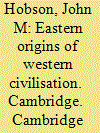

|
|
|
|
|
| Publication |
Cambridge, Cambridge University Press, 2004.
|
| Description |
xiii, 376p.Pbk
|
| Standard Number |
0521547245
|
|
|
|
|
|
|
|
|
|
|
|
Copies: C:1/I:0,R:0,Q:0
Circulation
| Accession# | Call# | Current Location | Status | Policy | Location |
| 049194 | 909.09821/HOB 049194 | Main | On Shelf | General | |
|
|
|
|
| 5 |
ID:
157535
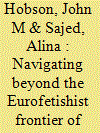

|
|
|
|
|
| Summary/Abstract |
This article argues that Critical IR theory’s (CIRT) claims to reflexivity, its engagement with “difference,” and its emancipatory stance are compromised by its enduringly Eurocentric gaze. While CIRT is certainly critical of the West, nevertheless its tendency toward “Eurofetishism”—by which Western agency is reified at the expense of non-Western agency—leads it into a “critical Eurocentrism.” While this Eurofetishism plays out differently across the spectrum of CIRT, nevertheless all too often the West is treated as distinct from the non-West such that a fully relational conception of the West—one in which the non-West shapes, tracks, and inflects the West as much as vice versa—is either downplayed or dismissed altogether. Our antidote to this problem is to advance such a relational approach that brings non-Western agency back in while simultaneously recognizing that such agency is usually subjected to structural constraints. This gives rise to two core objectives: first, that non-Western agency needs to be taken seriously as an ontologically significant process in world politics, and second, that it needs to be explored in its complex, manifold dimensions. Here we seek to move beyond the colonial binaries of non-Western “silence vs. defiance” and an “all-powerful West vs. powerless non-West.” For between these polarities lies a spectrum of instantiations of non-Western agency, running from the refusal to be known and categorized by colonial epistemes to mundane moments of everyday agency to the embrace of indigenous cosmologies through to modes of developmental and global agency. Sometimes these speak back to the West, and at other times they occur for reasons Other-wise. Ultimately we call for a relational sociology of global interconnectivities that problematizes CIRT’s Eurofetishization of the West as a separate, self-generating, self-directed, and hyper-autonomous entity.
|
|
|
|
|
|
|
|
|
|
|
|
|
|
|
|
| 6 |
ID:
091434
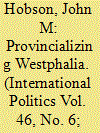

|
|
|
|
|
| Publication |
2009.
|
| Summary/Abstract |
This article critiques the 'Westphilian narrative' of the sovereign state. The dominant Eurocentric account assumes that the sovereign state emerged through a series of developments that unfolded endogenously within Europe, none of which were influenced or shaped by impulses that emanated from the East or from the non-Western world. Having outlined the various Eurocentric theories of the rise of the sovereign state, the bulk of the article forwards a non-Eurocentric alternative narrative. While accepting that there were multicausal economic, discursive, political and military foundations to sovereignty, I argue that each of these was significantly enabled by Eastern influences, in the absence of which the sovereign state might not have made an appearance within Europe. In the process, I suggest that the rise of the sovereign state occurred during the era of, and through the impact of, 'Oriental globalization', thereby recasting the relationship between sovereignty and globalization more generally
|
|
|
|
|
|
|
|
|
|
|
|
|
|
|
|
| 7 |
ID:
077895
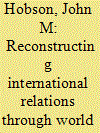

|
|
|
|
|
| Publication |
2007.
|
| Summary/Abstract |
In this article, I seek to move the agenda for historical sociology of international relations (HSIR) onto the next stage of research by considering how both international relations (IR) and HSIR can benefit from entering into a dialogue with World History and, more specifically, with what I call the 'new global history'. This is necessary because much of IR - and ironically, the vast majority of HSIR - suffers from ahistorical Eurocentrism. In this article, I begin the process of reconstructing IR by drawing on a range of non-Eurocentric arguments that are furnished in the new global history. My overarching framework explores how 'Eastern agency' and 'Oriental globalization' have informed many of the developments in world politics that are conventionally assumed to have Western origins. More specifically, I show how various global-dialogic relationships conducted between Eastern and Western agents have shaped the modern world, in particular capitalist modernity and the rise and spread of the sovereign state. In the final part of the article, I argue that great power politics under Oriental globalization differed fundamentally from Western hegemony/imperialism, thereby debunking the myth that great power politics can be universalized through time and place. In the conclusion, I suggest various areas of future research that could propel both IR and HSIR out of their ahistorical Eurocentric impasse.
|
|
|
|
|
|
|
|
|
|
|
|
|
|
|
|
| 8 |
ID:
133559
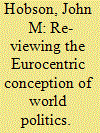

|
|
|
|
|
| Publication |
2014.
|
| Summary/Abstract |
This article responds to the five forum pieces that critically engage my 2012 book The Eurocentric Conception of World Politics, the central argument of which is that ever since 1760 international theory has not provided ideologically neutral, universalist explanations of world politics but has been charged, or even mandated, with the provincial objective of defending, promoting or celebrating Western civilization as the highest referent of the world. The first section defends the book's claim that pre-1945 realism was founded largely on various scientific racist bases (specifically between 1889 and 1945) - what I call 'racist realism' - while the second section defends my claim that classical realism and neorealism are not culturally neutral, universal approaches but are grounded in an underlying Western provincialism. The third section defends my reading of three pioneering figures of IR, John Burgess, Paul Reinsch and J.A. Hobson, while the fourth section reframes my non-Eurocentric reading of international theory in the last 250 years through a gendered lens so as to flesh out how gender/patriarchy and racism/Eurocentric institutionalism are mutually embedded, polymorphous discourses. Finally, the conclusion tackles the dual criticism that the book is limited by its Anglo-centric focus, on the one hand, and its situation within a critical tradition that is inherently European, if not Eurocentric, on the other
|
|
|
|
|
|
|
|
|
|
|
|
|
|
|
|
| 9 |
ID:
183724
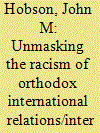

|
|
|
|
|
| Summary/Abstract |
This article emerges out of the racism debate in Security Dialogue (May 2020). It takes its cue from the passing claim that Orientalism/Eurocentrism is different from racism and that the former is deemed to be relatively innocuous while the latter is viewed as egregious. Here I reveal how Eurocentrism is equivalent to cultural racism. I show how racism has outwardly shapeshifted through time in everyday life and world politics, and how orthodox international relations theory’s racist trajectory has mirrored this. Since 1945, modern orthodox international relations theory has covered its racism with a non-racist mask through a sublimated discourse that focuses on cultural difference but is white racism in disguise. Unmasking modern international relations/international political economy theory exposes this sublimated racist discourse by revealing its racist double move: first, it whitewashes racism and denies its presence in the conduct of world politics and the global economy in the last three centuries, thereby providing an apologia for racist practices; second, it advances subliminal cultural-racist analytical/explanatory frameworks. I close by solving the conundrum as to how white orthodox international relations scholars who are most probably non-racist (though not anti-racist) in their personal lives embrace, albeit unwittingly, racist theories of world politics and the global economy.
|
|
|
|
|
|
|
|
|
|
|
|
|
|
|
|
| 10 |
ID:
110480
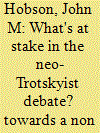

|
|
|
|
|
| Publication |
2011.
|
| Summary/Abstract |
This article seeks to appraise the direction that historical sociology has undertaken within Millennium in the last four decades while simultaneously laying out the groundwork for a 'thirdwave' historical sociology of international relations. In particular, I intervene in the current neo-Trotskyist debate concerning whether the concept of uneven and combined development (U&CD) should be historically generalised or merely confined to the modern capitalist-industrial era that emerged as late as the 19th century. My aim is to support the former position. I argue that failure to historically generalise the concept - at least to a certain extent - leads ultimately into a Eurocentric cul-de-sac. To advance my third-wave non-Eurocentric historical sociological approach, I apply U&CD to the rise of the West in general and to British industrialisation in particular. By extending U&CD back to at least 800 CE, I argue that the West was a late developer that enjoyed the advantages of backwardness. That is, only by borrowing from, and assimilating the technologies, ideas and institutions of, the key early developers - China, India and the Islamic Middle East/North Africa - could Europe rise up from its tiny promontory on the far western edge of the vast Afro-Asian economy to eventually overtake its Eastern predecessors some time during the 19th century.
|
|
|
|
|
|
|
|
|
|
|
|
|
|
|
|
|
|
|
|
|